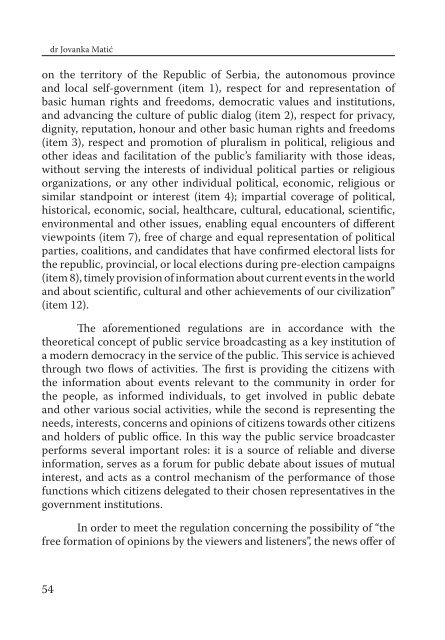Create successful ePaper yourself
Turn your PDF publications into a flip-book with our unique Google optimized e-Paper software.
dr Jovanka Matić<br />
on the territory of the Republic of Serbia, the autonomous province<br />
and local self-government (item 1), respect for and representation of<br />
basic human rights and freedoms, democratic values and institutions,<br />
and advancing the culture of public dialog (item 2), respect for privacy,<br />
dignity, reputation, honour and other basic human rights and freedoms<br />
(item 3), respect and promotion of pluralism in political, religious and<br />
other ideas and facilitation of the public’s familiarity with those ideas,<br />
without serving the interests of individual political parties or religious<br />
organizations, or any other individual political, economic, religious or<br />
similar standpoint or interest (item 4); impartial coverage of political,<br />
historical, economic, social, healthcare, cultural, educational, scientific,<br />
environmental and other issues, enabling equal encounters of different<br />
viewpoints (item 7), free of charge and equal representation of political<br />
parties, coalitions, and candidates that have confirmed electoral lists for<br />
the republic, provincial, or local elections during pre-election campaigns<br />
(item 8), timely provision of information about current events in the world<br />
and about scientific, cultural and other achievements of our civilization”<br />
(item 12).<br />
The aforementioned regulations are in accordance with the<br />
theoretical concept of public service broadcasting as a key institution of<br />
a modern democracy in the service of the public. This service is achieved<br />
through two flows of activities. The first is providing the citizens with<br />
the information about events relevant to the community in order for<br />
the people, as informed individuals, to get involved in public debate<br />
and other various social activities, while the second is representing the<br />
needs, interests, concerns and opinions of citizens towards other citizens<br />
and holders of public office. In this way the public service broadcaster<br />
performs several important roles: it is a source of reliable and diverse<br />
information, serves as a forum for public debate about issues of mutual<br />
interest, and acts as a control mechanism of the performance of those<br />
functions which citizens delegated to their chosen representatives in the<br />
government institutions.<br />
In order to meet the regulation concerning the possibility of “the<br />
free formation of opinions by the viewers and listeners”, the news offer of<br />
NEWS AND INFORMATION PROGRAMMING OF THE SERBIAN NATIONAL AND<br />
VOJVODINA REGIONAL PUBLIC SERVICE BROADCASTERS (RTS AND RTV)<br />
the PSB should be independently formed, and be based on professional<br />
standards. In addition, it should be highly diverse both in terms of themes<br />
covered and the news actors who represent various ideas and viewpoints.<br />
In order for the PSB to enable the “free expression of the opinions of<br />
viewers and listeners”, it should provide an appropriate representation of<br />
the citizens and their associations.<br />
The analysis is therefore focused on several aspects of the news<br />
and information programmes: their thematic structure, the structure<br />
of actors whose activities and opinions are covered, and the level of<br />
professional engagement of journalists as authors of news stories.<br />
Identification of the thematic structures of news and information<br />
programmes should show whether there is diversity in the themes<br />
covered. The essence of journalism is selection. The investigation of the<br />
applied thematic selection matrices therefore is done in order to show<br />
which topics are chosen as dominant and which social groups are closest<br />
to the media’s list of thematic priorities. This demonstrates the “agenda<br />
setting” function of media.<br />
A goal of investigating the social actors whose activities and<br />
opinions are presented is to determine how the public service broadcasters<br />
distribute the possibility of publicity, or in other words, which social<br />
positions are given a chance to introduce other members of society with<br />
their activities and opinions. It is in the nature of journalistic work to give<br />
most attention to those institutions which, by the very type of activities<br />
they perform, possess the most information and whose activities have<br />
the strongest effect on the majority of the population, which, by both<br />
of these definitions, are the institutions of government. However, the<br />
public service broadcaster, as an institution of the democratic order,<br />
has an obligation to connect the citizens with the processes of decision<br />
making, to stimulate them to participate in democratic processes and to<br />
enable them to influence the decision makers and therefore to give great<br />
attention to the representation of the citizens and their associations. The<br />
analysis hence pays special attention to the presence of the voices of the<br />
citizens, i.e. their chance to speak to others about themselves, their place<br />
in the world and their view of the world.<br />
54 55


